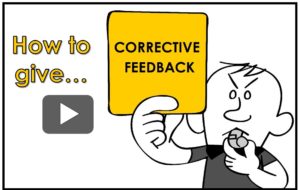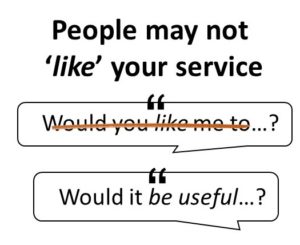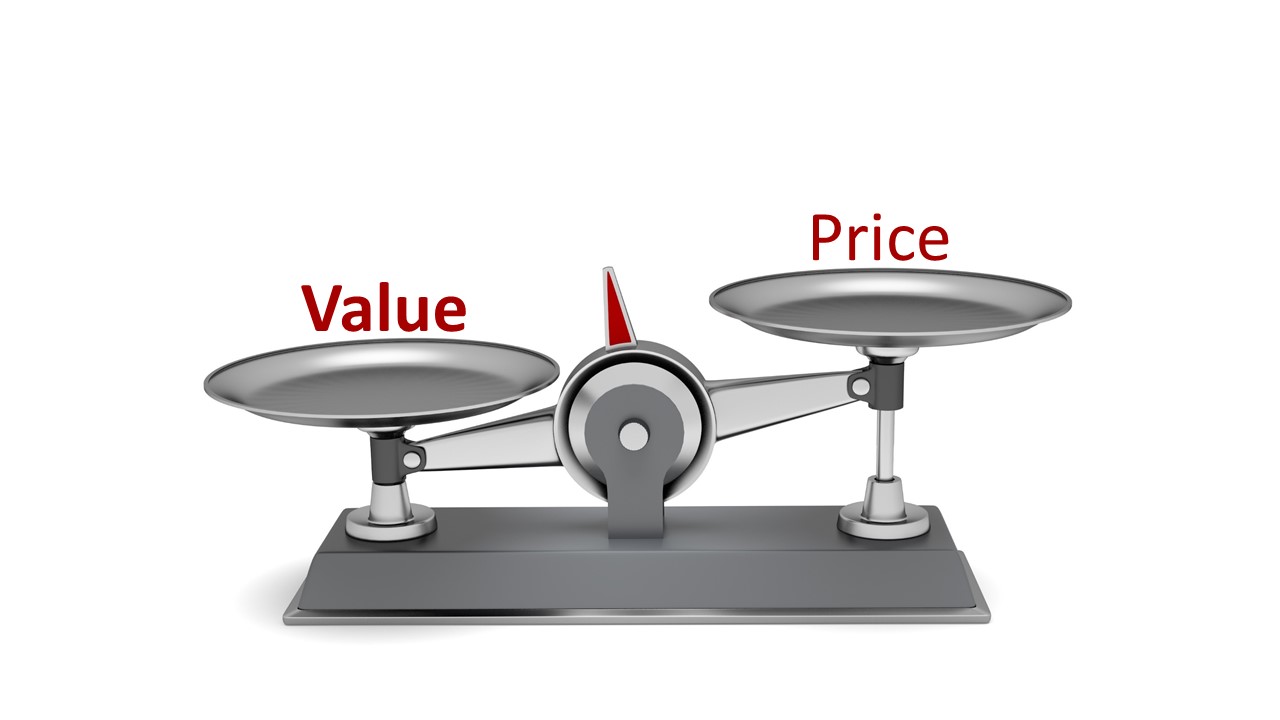Trusted Advisor Customer Service Blog Posts
Written By Jeff Mowatt – (all original content not AI generated)
Written By Jeff Mowatt – (all original content not AI generated)
Saying No and Still Building Trust
 To be an effective parent to children, supervisor to team members, or advisor to customers there's one particular word you occasionally need to tell people they won't necessarily want to hear - 'No'. Some people claim you should never say that word to a customer and instead find a positive spin to what you can offer. While that approach has some merit, I believe that when someone asks you a direct yes or no question, if the answer is no then we should say it immediately, clearly, and unequivocally - followed by explanation or alternatives - even though they may not like it. Being direct and upfront earns trust, which is more important in long term relationships than being liked every minute by everyone.
To be an effective parent to children, supervisor to team members, or advisor to customers there's one particular word you occasionally need to tell people they won't necessarily want to hear - 'No'. Some people claim you should never say that word to a customer and instead find a positive spin to what you can offer. While that approach has some merit, I believe that when someone asks you a direct yes or no question, if the answer is no then we should say it immediately, clearly, and unequivocally - followed by explanation or alternatives - even though they may not like it. Being direct and upfront earns trust, which is more important in long term relationships than being liked every minute by everyone.
5 Ways to Make Price less Relevant
"It drives me crazy when my sales people complain our prices aren’t competitive.” This was a manager who brought me in to work with his team. He continued, “How do I get my team members to stop selling on price?” After years of training numerous sales and service teams (whose prices weren’t the lowest) I’ve discovered five simple strategies for making price less relevant.
1. Know what B-B Customers Value
When you’re selling business to business remember that your customers are not usually spending their own money. They’re spending their company’s. Whether you save their company a bit of money or not doesn’t impact them personally. However, customers will happily spend more on suppliers who: a) make them look smarter to their bosses or b) make their jobs easier (or more fun). Make your b-b customers look like heroes to their bosses. Or take some paperwork off their hands. Your prices suddenly don’t need to be the lowest.
2. Replace Order Takers
If customers know exactly what they need and want to buy, then you don’t need a human for the transaction. You need an online shopping cart or a self-serve checkout. If your team members merely send out price quotes, you’re overpaying them. They can be replaced by an algorithm. Order taking has no value.
When an internet search reveals thousands of buying options, the service that customers value, is that of an Advisor who will A.I.D© customers to make the right choice. A.I.D. is a memory jogger I created that means: A- Analyze available choices, I- Interpret those options based on the customer’s unique needs, and D-Direct the customer to a maximum of three choices. Massive selection is available on the internet for free (another word for worthless). Making the wrong choice is costly. Customers will pay premiums for Advisors who help them make better buying choices.
3. Tap the Convenience Advantage
We all expect neighborhood convenience stores to charge more for household goods than a suburban big box store. How does your company compare when it comes to convenience? Perhaps customers can secure multiple products or services though you, and therefore not have to source other suppliers. That’s a significant savings (see strategy #1 about making their jobs easier, and #2 about helping them make better choices). It’s not enough though to just provide these conveniences; we also need to draw attention to how easy it is.
4. Create more perceived value
You’ve likely heard customers don’t buy features, they buy benefits. The problem is most sales and service reps inadvertently focus on product and service features. The easiest way I found to get employees to talk more about benefits is encouraging them to use two words more often: “So that”. For example, “We’ll deliver it so that we save you a trip.” Often we don’t need to lower our prices, we just need to raise perceived value by highlighting benefits.
5. Create pricing perspective
Whatever you charge can look like a lot of money if you don’t provide context. For example, training team members on how to enhance their service and selling skills can sound expensive. That needs to be contrasted to potential revenues generated by that training resulting in gaining or keeping just one repeat customer. When put that way, training becomes an investment that easily pays for itself. The more you talk about return on investment, the less your actual prices will matter.
Bottom Line - That manager who hired me knew his team members didn’t need to focus on lowering prices and profitability. They just needed to shift their thinking about the additional value they can and do provide. How about you? Could your team members use some refreshers on enhancing perceived value over price?
Why we Shouldn’t Pick People’s Brains
 In my Trusted Advisor seminars we often discuss what I call the humility advantage. An example is asking customers and coworkers for their advice. Requesting advice implies humility while conferring respect. Speaking of word choices, a common phrase when asking someone to share their expertise is, "Can I pick your brain?" As Stephanie Staples, one of the brilliant speakers at our Customer Service Leadership Summit pointed out, picking someone's brain is clichéd and somewhat crude. Stephanie's alternative: instead ask "Can I tap your brilliance?" It's less crass and more complimentary.
In my Trusted Advisor seminars we often discuss what I call the humility advantage. An example is asking customers and coworkers for their advice. Requesting advice implies humility while conferring respect. Speaking of word choices, a common phrase when asking someone to share their expertise is, "Can I pick your brain?" As Stephanie Staples, one of the brilliant speakers at our Customer Service Leadership Summit pointed out, picking someone's brain is clichéd and somewhat crude. Stephanie's alternative: instead ask "Can I tap your brilliance?" It's less crass and more complimentary.
With customers, are you using The Humility Advantage?
 Conventional wisdom among writers is to assume readers have the intelligence of seventh graders. The premise is keep your message simple enough for a child to understand. Actually, when it comes to communicating with customers, I believe the opposite is true. The more you treat your customers like they are smart, well intentioned grown-ups, the more receptive they'll be to your expertise. So, before explaining something to a customer, demonstrate your confidence in their competence. Start with phrases along the lines of, "You probably already know..." "At your level in the company, this may be old hat or obvious, but other team members may not be aware of..." "I doubt this is new to you..." Not surprisingly, customers like to do business with people who seem to think they are important and smart. It's a simple, powerful approach I call, The Humility Advantage.
Conventional wisdom among writers is to assume readers have the intelligence of seventh graders. The premise is keep your message simple enough for a child to understand. Actually, when it comes to communicating with customers, I believe the opposite is true. The more you treat your customers like they are smart, well intentioned grown-ups, the more receptive they'll be to your expertise. So, before explaining something to a customer, demonstrate your confidence in their competence. Start with phrases along the lines of, "You probably already know..." "At your level in the company, this may be old hat or obvious, but other team members may not be aware of..." "I doubt this is new to you..." Not surprisingly, customers like to do business with people who seem to think they are important and smart. It's a simple, powerful approach I call, The Humility Advantage.
Know this one tip about motivating young employees
Attending one of my seminars on "Leading a Customer Focused Team", a manager lamented, "Young employees are just not motivated to work as hard as we did at that age." Actually, young people are indeed motivated and connected; just not to what most managers talk about. Young employees are sometimes referred as generation Y. A more helpful description is generation why. They want to know how the organization will have a positive impact on society. And how the task they are asked to perform will benefit their own careers. That's why, at my Trusted Advisor seminars, we begin by discussing why choosing words that earn trust and enhance customer experience will make their job easier, reduce conflict, and enhance their personal relationships. Young folks have no problem at all working hard and implementing new approaches. They just need to know how it's also in their own best interests.
How to Collect from Late Paying Customers
Nine tips for getting paid without creating hard feelings
 Ever experience the awkwardness of having to call a customer to remind them to pay their bill? You walk a fine line of diplomacy. Being a pushover won’t get the customer’s attention. Being too pushy can offend risking losing not only money that’s due, but future business as well. Most of the training I do is on choosing words that enhance trust and differentiate your service to make price less relevant. You can use these same trust building principles to gain cooperation with customers who aren’t paying. Consider these nine tips…
Ever experience the awkwardness of having to call a customer to remind them to pay their bill? You walk a fine line of diplomacy. Being a pushover won’t get the customer’s attention. Being too pushy can offend risking losing not only money that’s due, but future business as well. Most of the training I do is on choosing words that enhance trust and differentiate your service to make price less relevant. You can use these same trust building principles to gain cooperation with customers who aren’t paying. Consider these nine tips…
1. Do your homework
Start by gathering details about the invoice and about how much overall business the customer does with you. Any large volume customer isn’t going to be happy about receiving a collection call over a relatively small invoice. In fact they may rethink continuing to do business with you. On the other hand, a first time customer with a large overdue bill should be contacted sooner rather than later. When it comes to collecting, it makes sense to give long term customers special consideration.
2. Begin with a courtesy email
The first reminder can be a friendly email sent soon after payment is due. Keep the tone light and conversational: “Pat, I was looking through our receivables and noticed we haven’t received a payment yet on this invoice. I want to make sure you did indeed receive it and there’s nothing you need from our end. Thanks.”
3. Stand up for yourself
If the email doesn’t receive a reply, it’s time to pick up the phone. If you’re feeling anxious, stand up when you phone. Your voice will have more resonance and authority, and you feel more confident and in control.
4. Share facts not accusations
Certain phrases can inadvertently sound like accusations that put customers on the defensive. Telling people they are late or overdue sounds like a generalization. Instead give specific dates and encourage them to talk, “Payment was due on the 17th and as of today we haven’t received it. Is there something about the payment I should be aware of?” Listen. Gather facts. Take notes. This isn’t the time to state your position. Instead, summarize you’re understanding of the facts you collected. “So if I understand this correctly, the situation at your end is…?” A huge part of building trust with anyone is demonstrating that you get their circumstances.
5. Empathize
After you’ve summarized your understanding of their situation, if they have indeed been experiencing financial setbacks, then empathize. Begin with two magic words: sounds like. “Sounds like you’ve had a run of unfortunate events. I’m sorry to hear that.” Those words make you sound humane and go a long way towards making late paying customers want to cooperate.
6. Don't make it personal
This is the opposite of what I normally share in my Trusted Advisor seminars. Typically, we personalize the service by using the word “you”, as in, “Let me check for you.” In the case of collections however, the last thing we want is for this to be taken personally. So rather than asking, “When can you pay?” Instead ask, “When can we expect payment?” Speaking of word choices, avoid asking if they “want” to pay by installments. Few people want to pay bills. Instead ask, “Would it be helpful if we set up a payment plan?”
7. Express your Grand Intention©
If you are indeed dealing with a normally reliable repeat customer, explain that you value their business and want to help them through this. I call it expressing your grand intention. It sets a positive tone and implies that you’re interested in achieving a long-term mutually positive outcome. Again, the goal is for them to feel motivated to pay.
8. Summarize your understanding
Before hanging up, clarify what you and the customer have decided, “For my notes and to make sure I have everything clear, here’s what we’ve agreed upon moving forward…” Then send them a written summary confirming what you discussed. That way if you end up in court you’ll have documentation.
9. Last resorts
If you conclude there’s slim hope of collecting all monies or that you no longer want to continue doing business with that customer, consider settling for less than the full amount. In most cases, you’ll be further ahead financially than what you’d receive by either suing them or engaging a collection agency. Speaking of unpleasant customers, some business owners have told me they meet once a year with their staff to ‘fire’ their one or two worst customers. These are individuals who create more stress than they are worth. In that case they send the customer a letter along the lines of, “It appears you have not been satisfied… we are therefore asking that in future you use the services of (competitor).”
Bottom Line - While phoning customers to get paid may be daunting, fortunately by simply being a strong listener and choosing your words more thoughtfully, you can make collecting from customers less unpleasant and more rewarding. Good luck!
How to give corrective feedback without offending
 Whether you're a supervisor, parent, or friend of someone who's messing up, there are times when doing the right thing means confronting their inappropriate behavior. Unfortunately, one misspoken word can inadvertently cause offense and the whole thing can get ugly. The good news is in this short video I share a little tip that makes a big difference in gaining cooperation.
Whether you're a supervisor, parent, or friend of someone who's messing up, there are times when doing the right thing means confronting their inappropriate behavior. Unfortunately, one misspoken word can inadvertently cause offense and the whole thing can get ugly. The good news is in this short video I share a little tip that makes a big difference in gaining cooperation.
How to tweak people’s interest
 Here's a handy tip to stimulate customer interest. Before providing information, offer a "teaser" benefit. Then ask if it would be "useful" for them to hear about it. For example, before you describe your company's background, you might say, "It's important to know that the people you do business with are well established, so you're not left in a lurch. Would it be useful for you to hear about the company's background?" Now, you're not perceived to be "selling." Instead, you're providing information that's useful.
Here's a handy tip to stimulate customer interest. Before providing information, offer a "teaser" benefit. Then ask if it would be "useful" for them to hear about it. For example, before you describe your company's background, you might say, "It's important to know that the people you do business with are well established, so you're not left in a lurch. Would it be useful for you to hear about the company's background?" Now, you're not perceived to be "selling." Instead, you're providing information that's useful.
Two common words that annoy rushed customers
 Imagine that as a customer you are asking a service provider when you can expect delivery. Their response: "Don't worry, it will be there on time." The phrase don't worry is...well...worrisome. Telling a customer, don't worry comes across as giving an order. Most people don't like to be told what to do. And it implies that the customer is overly emotional. The fact is, the customer might not be worried at all. They just want to find out when something will be done. So don't worry comes across as patronizing. That's a lot of negatives for two little words. My suggestion - replace don't worry with rest assured, as in: "Rest assured, it will be there on time." It's positive, polite, and implies that you'll take care of business while the customer rests.
Imagine that as a customer you are asking a service provider when you can expect delivery. Their response: "Don't worry, it will be there on time." The phrase don't worry is...well...worrisome. Telling a customer, don't worry comes across as giving an order. Most people don't like to be told what to do. And it implies that the customer is overly emotional. The fact is, the customer might not be worried at all. They just want to find out when something will be done. So don't worry comes across as patronizing. That's a lot of negatives for two little words. My suggestion - replace don't worry with rest assured, as in: "Rest assured, it will be there on time." It's positive, polite, and implies that you'll take care of business while the customer rests.
The Most Powerful Words in Customer Service
 When babies are born one of the first questions people ask the proud parents is, ‘What name did you choose?’ Every culture chooses names for their children. As humans, we view our first and last names as more than mere labels; they’re our identity. Perhaps that’s why in our working lives, customers instantly (sometimes subconsciously) distrust employees who don’t identify themselves. If your switchboard operators pick-up incoming calls without identifying themselves, or if you’re at a worksite without a name tag, or if you initiate a conversation with a customer without giving your name, it gives the impression you are hiding. Conversely, when you immediately identify yourself (it’s even more impactful when giving your first and last name), you convey that you are not a bureaucracy; you welcome being held accountable, and you are a grown-up professional. People’s names are the most powerful words in customer service; both yours and your customer’s.
When babies are born one of the first questions people ask the proud parents is, ‘What name did you choose?’ Every culture chooses names for their children. As humans, we view our first and last names as more than mere labels; they’re our identity. Perhaps that’s why in our working lives, customers instantly (sometimes subconsciously) distrust employees who don’t identify themselves. If your switchboard operators pick-up incoming calls without identifying themselves, or if you’re at a worksite without a name tag, or if you initiate a conversation with a customer without giving your name, it gives the impression you are hiding. Conversely, when you immediately identify yourself (it’s even more impactful when giving your first and last name), you convey that you are not a bureaucracy; you welcome being held accountable, and you are a grown-up professional. People’s names are the most powerful words in customer service; both yours and your customer’s.



